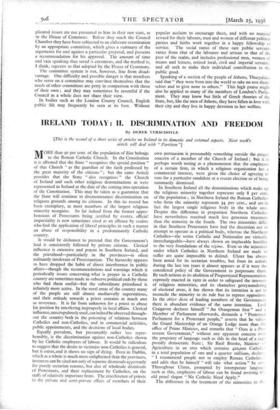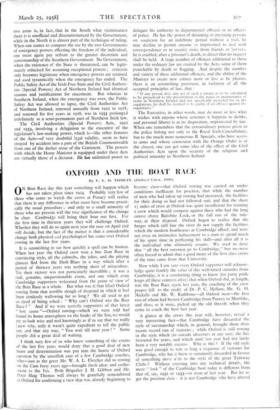IRELAND TODAY : IL DISCRIMINATION AND FREEDOM
By DEREK VERSCHOYLE
[This is the second of a short series of articles on Ireland in its domestic and external aspects. Next week's article will deal with " Partition"] MORE than 90 per cent. of the population of Eire belongs to the Roman Catholic Church. In the Constitution it is affirmed that the State " recognises the special position " of that Church " as the guardian of the faith professed by the great majority of the citizens " ; but the same Article provides that the State " also recognises " the Church of Ireland and such other religious denominations as were represented in Ireland at the date of the coming into operation of the Constitution. This may be taken as a guarantee that the State will continue to discountenance discrimination on religious grounds among its citizens. In this its record has been exemplary, as most members of the largest religious minority recognise. So far indeed from the former appre- hensions of Protestants being justified by events, official impartiality is now sometimes cited as an offence by zealots who find the application of liberal principles in such a matter an abuse of responsibility in a predominantly Catholic country.
It would be dishonest to pretend that the Government's lead is consistently followed by private citizens. Clerical influence is extensive and potent in Southern Ireland, and the priesthood—particularly in the provinces—is often militantly intolerant of Protestantism. The hierarchy appears to have dropped the habit of direct interference in public affairs—though the recommendations and warnings which it periodically issues concerning what is proper in a Catholic country are sometimes made to subserve political ends by those who find them useful—but the subordinate priesthood is infinitely more active. In the rural areas of the country many of the people are still almost mediaevally superstitious, and their attitude towards a priest contains as much awe as reverence. It is far from unknown for a priest to abuse his position by interfering improperly in local affairs. Clerical influence, unscrupulously used, can indeed be observed through- out the country both in the poisoning of relations between Catholics and non-Catholics, and in commercial activities, public appointments, and the decisions of local bodies.
Equally prevalent, but presumably rather less repre- hensible, is the discrimination against non-Catholics shown by lay Catholic employers of labour. It would be ridiculous to suggest that the desire to victimise non-Catholics is general, but it exists, and it shows no sign of dying. Even in Dublin, which as a whole is much more enlightened than the provinces, instances can be cited not only of separate dismissals apparently for purely sectarian reasons, but also of wholesale dismissals of Protestants, and their replacement by Catholics, on the staffs of relatively important firms. The interference of priests in the private and semi-private affairs of members of their own persuasion is presumably something outside the proper concern of a member of the Church of Ireland ; but it is perhaps worth noting as a phenomenon that the employees of a certain firm, in which a religious organisation has a commercial interest,• were given the choice of agreeing to vote for a particular candidate at a recent election or of being summarily dismissed.
In Southern Ireland all the denominations which make up the religious minority together represent only 8 per cent.
of the population ; in Northern Ireland the Roman Catholics who form the minority represent 34 per cent., and are in fact the largest single religious body in the whole area.
Despite this difference in proportion Northern Catholics have nevertheless received much less generous treatment than the minority in the South. The two minorities differ in that Southern Protestants have had the discretion not to attempt to operate as a political body, whereas the Northern Catholics—the terms Catholic and Nationalist are virtually interchangeable—have always shown an implacable hostility to the very foundations of the regime. Even so the injustices under which Catholics in Northern Ireland are made to suffer are quite impossible to defend. Ulster has always been noted for its sectarian troubles, but from its actions during the last ten years it almost appears as if it were the considered policy of the Government to perpetuate them.
By such actions as its abolition of Proportional Representation, expressly enacted in 192o in order to safeguard the interests of religious minorities, and its shameless gerrymandering of electoral areas, it has shown that its intention is not to reconcile the minority to its rule but to repress opposition. In the obiter dicta of leading members of the Government there is abundant evidence of the same intention. Lord Craigavon declares himself " An Orangeman first " and a Member of Parliament afterwards, demands a " Protestant Parliament for a Protestant people," asserts that he values the Grand Mastership of an Orange Lodge more than the office of Prime Minister, and remarks that " Ours is a Pro- testant Government," without any apparent concern over the propriety of language such as this in the head of a sur- posedly democratic State ; Sir Basil Brooke, Minister Agriculture in an area which contains 42o,000 Catholt, in a total population of one and a quarter millions, declare, " I recommend people not to employ Roman Catholics.•' and adds that he himself " will take what action " he car. Throughout Ulster, prompted by intemperate langu4 • such as this, employers of labour can be found reviving th _ old penal slogan " No Catholic Need Apply." The difference in the treatment of the minorities in th. two areas is, in fact, that in the South what victimisation there i9 is unofficial and discountenanced by the Government, while in the North it is almost part of the technique of ruling. When one comes to compare the use by the two Governments of emergency powers affecting the freedom of the individual, one must again pay tribute to the greater discretion and statesmanship of the Southern Government. No Government, when the existence of the State is threatened, can be legiti- mately criticised for assuming exceptional powers ; criticism only becomes legitimate when emergency powers are retained and used tyrannically when the emergency has ended. The Public Safety Act of the Irish Free State and the Civil Authori- ties (Special Powers) Act of Northern Ireland had identical reasons and justifications for enactment. But whereas in Southern Ireland, when the emergency was over, the Public Safety Act was allowed to lapse, the Civil Authorities Act of Northern Ireland, renewed annually from 1922 to 1928, and renewed for five years in 1928, was in 1933 prolonged indefinitely as a semi-permanent part of Northern Irish law.
The Civil Authorities (Special Powers) Acts, 1922 and 1933, involving a delegation to the executive of the legislature's law-making power, which is—like other features of the Acts—of very doubtful legal validity, seem to have strayed by accident into a part of the British Commonwealth from one of the darker areas of the Continent. The powers with which the Home Minister is equipped under these Acts are virtually those of a dictator. He has unlimited power to delegate his authority to departmental officials or to officers of police. He has the power of detaining or interning persons on suspicion for an indefinite period without a trial, he may decline to permit anyone so imprisoned to deal with correspondence or to receive visits from friends or lawyers, he is enabled, after a prisoner's death, to direct that no inquest shall be held. A large number of offences additional to those under the ordinary law are created by the Acts, some of them punishable by death or flogging. And despite the number and variety of these additional offences, and the ability of the Minister to create new crimes more or less as he pleases, there is an astonishing provision, in violation of all the accepted principles of law, that :
" If any person does any act of such a nature as to he calculated to be prejudicial to the preservation of the peace or maintenance of order in Northern Ireland and not specifically provided for in the regulations, he shall be deemed to be guilty of an offence against the regulations."
The Executive, in other words, may do more or less what it wishes with anyone whose activities it happens to dislike, and personal liberty is at its disposition, unprotected by law. When one remembers that the extraordinary powers given to the police belong not only to the Royal Irish Constabulary, but to the much more numerous B. Specials, who have access to arms and whose connexion with the Orange Order is of the closest, one can get some idea of the effect of the Civil Authorities Acts upon the security of the religious and political minority in Northern Ireland.











































































 Previous page
Previous page